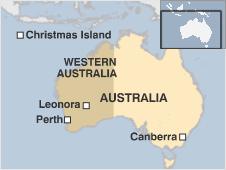Australia moves asylum seekers from Christmas Island
- Published

Australia has begun transferring dozens of asylum seekers from an overcrowded detention centre in the Indian Ocean.
They are moving to an old mining camp 830km (416 miles) northeast of Perth.
Officials say the Christmas Island facility can no longer cope with a recent influx of boat people in Australia's northern waters.
Initially 86 asylum seekers will move to the isolated gold mining town of Leonora while the authorities process their refugee claims.
'Accept them'
Home for a group of asylum seekers from Afghanistan, Iran and Sri Lanka is a disused mining camp in a remote, semi-arid corner of Western Australia.
The town of Leonora, with a population of 1,200 people, has answered a call from the federal government to help it alleviate overcrowding at the Christmas Island detention centre.
Additional health and education services will be provided to help the small gold mining community cope with the new arrivals.
The president of the town council, Jeff Carter, hopes those residents who oppose the relocation of asylum seekers will change their minds.
"Most of the negative feeling is people should go back where they come from. That is the impression I got," he said.
"Personally, I've got no great objection. I don't agree with the people coming by the boats but our government does accept them, to help them when they come to our shores. I'd just like to help people that way if we can. I hope that the town would accept them."
The government says the asylum seekers are likely to remain in Leonora for up to six months while their applications to stay in Australia are processed.
Refugee groups hope the gold mining town will provide a "merciful haven for the families" while the political debate over immigration intensifies.
With a federal election expected in Australia in the coming months, the conservative opposition has promised to send asylum seekers to detention camps in neighbouring countries as part of a hard-line plan to deter boat people.
Critics have derided the policy as "cruel" and ineffective.